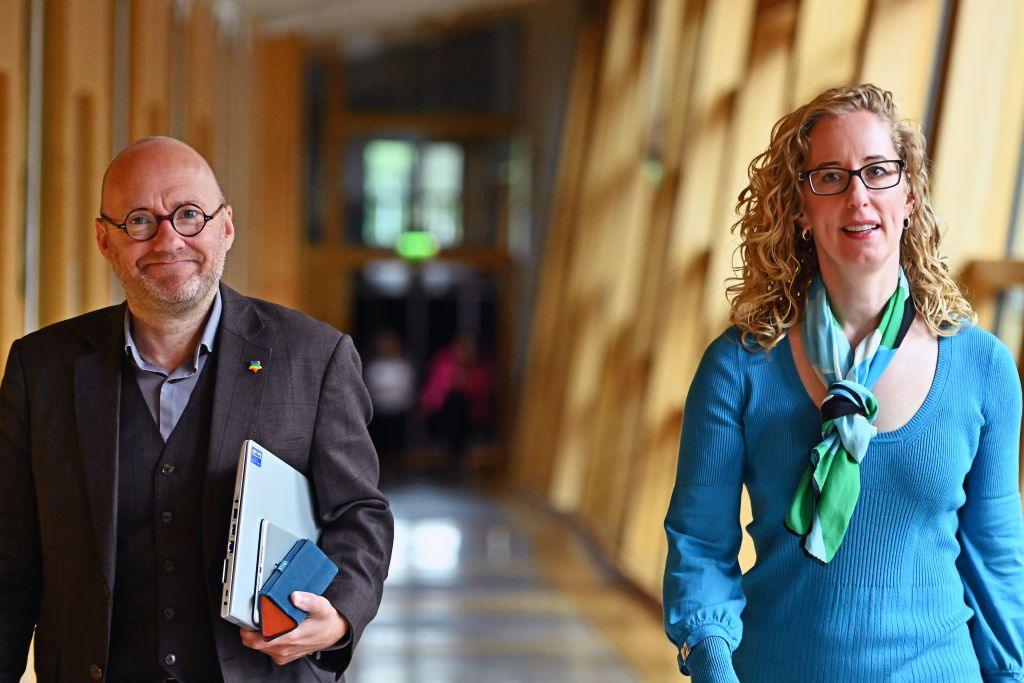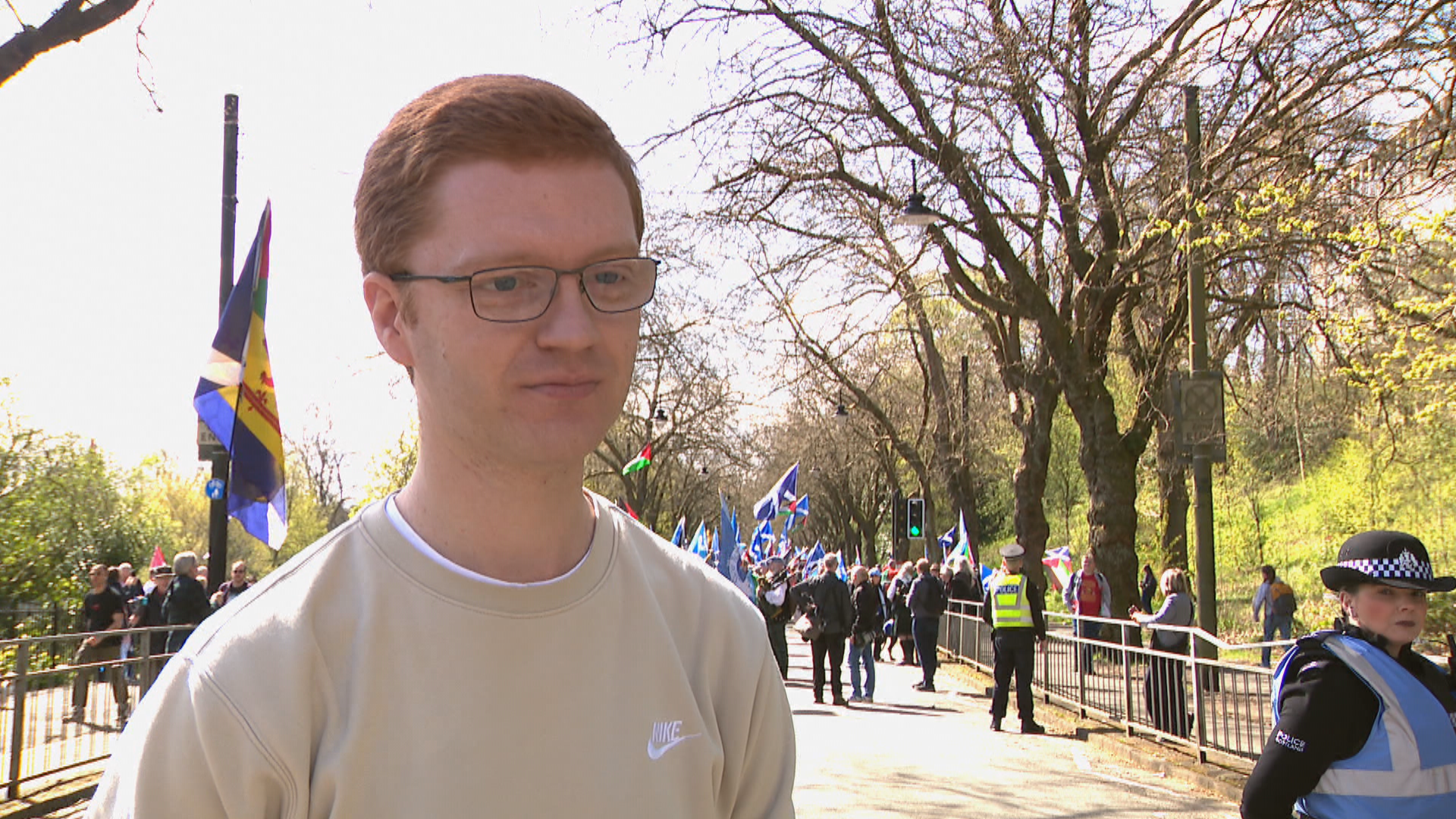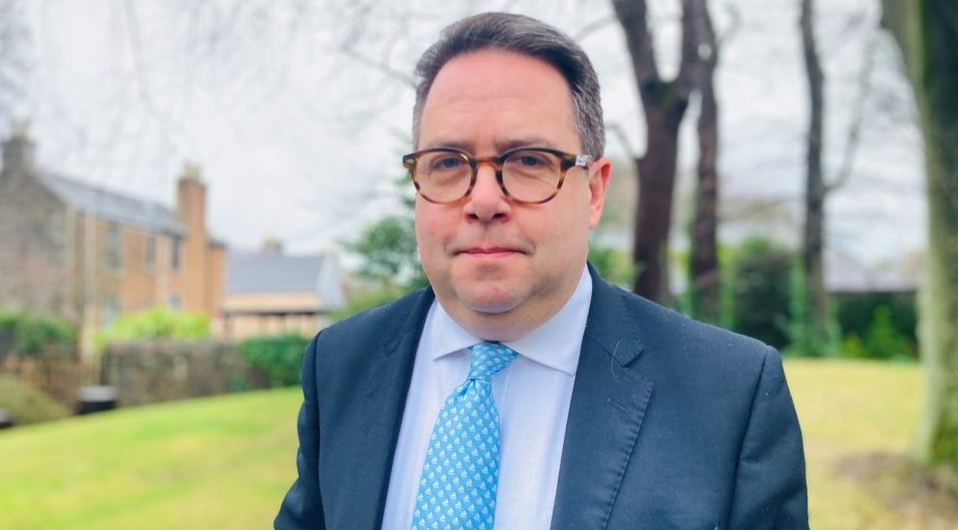SNP will form minority government if Greens end deal
'I really value the Bute House agreement' - Yousaf
- Published
The SNP will form a minority government if the Scottish Greens vote to ditch their power-sharing agreement, BBC Scotland News understands.
Green members are to vote on whether to remain in government after the SNP scrapped key climate change targets.
Co-leader Patrick Harvie said things had “come to a head” with calls from members for a debate about the way forward.
The Greens are to hold an extraordinary general meeting to decide the issue.
The BBC understands it is expected to hear a single motion on "whether the party continues to co-operate with the Scottish government or not".
First Minister Humza Yousaf has said he values the power-sharing deal - known as the Bute House agreement, external - and does not expect it to be scrapped.
Scottish Greens to vote on SNP power-sharing deal
- Published20 April 2024
Sunak has set us back, says climate watchdog head
- Published20 April 2024
But he indicated that his party members would not be getting another vote on the issue, despite calls from senior SNP figures such as Kate Forbes.
Mr Yousaf reiterated his support for the agreement before a pro-independence march in Glasgow - at which he was joined by Greens MSP Ross Greer.
When asked if he expected to soon be leading a minority government, he said: "I don’t think that will be the case but it’s clearly a discussion that the Greens will have to have."
The first minister added: "I really value the Bute House agreement. We’ve achieved a lot in government and I want to keep achieving a lot with the Green Party.
"Our members have had a vote before. There have been discussions about the Bute House agreement and we are supportive of it because we’ve achieved a lot in government, delivering on priorities of the people."

Scottish Greens co-leaders Patrick Harvie and Lorna Slater currently hold government posts
Both Patrick Harvie and his Scottish Greens co-leader Lorna Slater are ministers in the Scottish government and will argue that their party should stay there.
Ms Slater said the purpose of the extraordinary general meeting would be to allow members the opportunity to decide how to proceed, nearly three years after joining the SNP in government.
She said: “We have achieved more for people and planet in the past 32 months than other parties have in decades. Now we want to hear from our members on how they want us to continue this progress.
“Not everything in politics is easy, as we have seen over recent years, months and days, but our strength as a green movement is in standing up against those destructive forces who would set fire to everything we have achieved if given half the chance."

The Scottish Greens have around 7,500 members. They’ll all have a vote on whether their party stays in government.
But the ramifications of this will go well beyond that membership.
The whole logic behind the Bute House agreement was that it made government smooth. There is a (more or less) guaranteed majority that means budgets and legislation (theoretically) sails through Holyrood.
If the Greens were to ditch it the SNP would govern alone, but short of that majority.
That would mean negotiations with other parties to get anything done. That eats up time and political capital.
We’re not there yet – this Green vote is still weeks away.
But there’s certainly disquiet in the Scottish Greens. And the idea of their members voting to walk away can’t be discounted at this point.

The party has not announced the date of the meeting but the BBC has been told it will happen some four weeks after members have been emailed to inform them of it.
The announcement of the vote came just a day after the SNP-Green government in Edinburgh confirmed it would scrap its annual and interim targets for cutting greenhouse gas emissions
This followed analysis of a critical report from the independent Climate Change Committee., external

Scottish Greens MSP Ross Greer is confident members will vote to stay in government
Greens MSP Ross Greer said he was confident that party members would vote to "support the role that we have in government and the good that we’re doing for Scotland as a result of that".
He added: "Walking away is not going to make life better for people in Scotland and it’s certainly not going to help the planet.
"There will not be more climate action if we leave the government – there will be less."
Patrick Harvie has also defended the Greens remaining in government, saying their participation has led to “record investment in climate and nature, free bus travel for more young people, rent protection, and much more.”
But Scottish Greens councillor Chas Booth, who represents Leith on City of Edinburgh Council, told BBC Radio's Good Morning Scotland programme that as things stood he would vote to withdraw support.
He said: "Dropping the 2030 target altogether without replacing it with anything that is more achievable looks to me like we’ve, in a sense, given up and walked away on climate. That is unacceptable from my perspective."
'Mutual interest'
Some Greens are also unhappy about NHS Scotland’s decision to pause the prescription of puberty blockers following a landmark review of gender services in England by paediatrician Dr Hilary Cass.
After the NHS Scotland announcement the party’s LGBT wing, the Rainbow Greens, started a petition questioning the future of the deal with the SNP.
The group’s co-convener, Jen Bell, said the move had broken a promise in the Bute House agreement to “put trans patients at the heart of decisions on their own healthcare.”
Dr Cass said “we don’t have good evidence” that puberty blockers — which she defines as hormone treatment that stops the progress of puberty — are safe.
The vote of Scottish Green members will be binding, according to a party source.
The Bute House agreement is described as a “shared draft policy programme” in areas of mutual interest such as climate change, economic recovery from the pandemic and child poverty.
It also takes in the natural environment, energy and the constitution.
Both the Scottish Greens and the SNP advocate for an independent Scotland.

Scottish Conservatives chairman Craig Hoy said the SNP/Greens government had been a failure
The Scottish government’s decision to abandon its 2030 emissions target put the Greens in the firing line for criticism more often aimed at the senior partners in the deal.
Scottish Conservatives chairman Craig Hoy said the Greens should be "nowhere near the levers of power within government".
He added: "The SNP's independence-obsessed coalition with their anti-growth Green counterparts has been a farcical disaster for Scotland.
“The overwhelming failure of this deeply damaging nationalist coalition is having a devastating impact on communities and businesses which is why the Bute House Agreement needs to be scrapped."
Scottish Labour's deputy leader Jackie Baillie said it was no surprise that Green party members had "lost faith" in an SNP-Green government which had "failed to deliver at every turn".
She added: "While Green MSPs cheer on Humza Yousaf in Holyrood, he is slashing climate targets and siding with oil and gas giants who are raking in billions in profit.
“This SNP-Green government’s failures mean higher bills, fewer green jobs and other countries winning the global race for clean energy."
Meanwhile, Chris Stark - the head of a government watchdog Climate Change Committee (CCC) - said it was "desperately disappointing" that the SNP government had ditched one of its climate targets. But he said the targets had been "over-ambitious" from the start.
Tax hikes
"I love ambition, but it only matters if you actually deliver against that," he said.
"Now what we've seen in this week is desperately disappointing from the Scots, they've pulled away essentially the target framework, almost in its entirety, leaving the net zero target, but removing the targets for 2030 and 2040.
"And the reason they've done that is because the 2030 target was over-ambitious."
Humza Yousaf has also come under pressure from within his own party to end the power-sharing deal.
Kate Forbes, whom Mr Yousaf only narrowly defeated in the SNP leadership contest just over a year ago, is among those who have called for the Bute House agreement to go.
In December she said, external “nearly all the issues that have lost us support in the last year are found in the Bute House agreement and not in the SNP manifesto.”
The Greens, said Ms Forbes, had a progressive, ideological agenda which was unpopular in the country at large and were also hitting rural communities with over-regulation and tax hikes.
The party has been involved in several difficult policy issues, with legislation stalling on issues including protecting the oceans and recycling bottles.